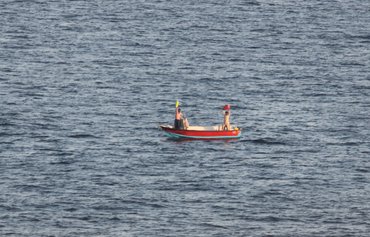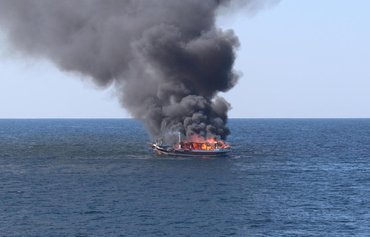US Naval forces deployed in the waters of the Gulf, the Gulf of Oman, the Red Sea, the Arabian Sea and parts of the Indian Ocean are part of an international naval partnership that provides security for civilian maritime traffic.
The personnel and ships of the 26-nation Combined Maritime Forces are organised into three principal task forces that provide security for civilian maritime traffic by conducting counter-piracy and counter-terrorism missions.
In addition to supporting these missions, the US 5th Fleet has taken part in numerous rescue operations in regional waters and has provided engineering, mechanical and medical support to vessels in distress, Navy officials said.
Ships deployed to US Naval Forces Central Command have assisted mariners on more than 30 occasions since 2012, they said, 13 of which involved Iranian mariners.
Helping distressed Iranian vessels
On November 18th, the USS Nitze came to the rescue of three Iranian fishermen, whose small vessel was stranded due to a dead battery.
The crew of the guided-missile destroyer, which is deployed in Gulf waters in support of maritime security operations, located and identified the boat and supplied the fishermen with a new battery and a case of water.
A few days later, on November 29th, two US warships deployed in support of maritime security operations came to the aid of six Iranian mariners in distress.
The USS Hopper and USS Monterey received a distress call from a small Iranian fishing dhow via bridge-to-bridge radio, the US Naval Forces Central Command said.
In response, Monterey dispatched its helicopter to locate the vessel, while Hopper prepared its boarding team to render immediate assistance to the mariners, the Navy said.
When Hopper’s sailors boarded the vessel, they found the six mariners aboard were ill. Hopper's sailors provided the Iranian crew with medicine and departed after ensuring the crew was safe.
"Under customary international law, we continue the time-honoured tradition of assisting mariners in distress and are proud to have rendered aid to our fellow mariners," said Cmdr. J. D. Gainey, Hopper's commanding officer.
Supporting maritime security
"The US presence in the Gulf and Sea of Oman is crucial and beneficial to all countries," Omani strategy expert and maritime law specialist Suleiman al-Suwaidi told Al-Mashareq.
It secures the flow of the world oil supply and ensures it does not fall under the control of any party that could cause tension in the region and harm to the world economy, he said.
"The US Navy, in collaboration with the navies of neighbouring countries, has helped curb piracy and safeguard global trade from a danger that threatened the lives of sailors, as well as goods and commodities," he added.
"Bilateral and collective relations and co-operation agreements provide for [the US presence] and ensure a balanced relationship between the countries of the region, and Gulf countries in particular, and the US," al-Suwaidi said.
The relationship between the military forces of Gulf Co-operation Council (GCC) countries and the US military is "excellent", Omani international relations expert Jassim al-Shamsi told Al-Mashareq.
The US "provides services to the region that cannot be overlooked, particularly with respect to protecting the waters of the Gulf, Sea of Oman, north Arabian Sea, Gulf of Aden and the Red Sea", he said.
Significant humanitarian role
US Naval forces deployed in regional waters also play a significant humanitarian role, al-Shamsi said, by helping with rescue operations regardless of the nationality of those who request help.
"They ultimately deal with everyone from the standpoint that they are humans in need of a helping hand and assistance," he said.
"Rescue operations are part of a humanitarian protocol observed by sailors, but some ignore the distress calls they receive while others respond very quickly," said strategy expert Maj. Gen. Ahmed Abdel Halim, of Egypt's Nasser Military Academy.
US Naval forces provided a rapid response to the November 18th distress call of the three stranded Iranian fishermen, he said.
"US forces get credit for their humanitarian efforts, for they observe long time-honoured traditions and separate political from military considerations, and opt that relief work be done for the sake of humanity," he said.

![Sailors assigned to the guided-missile destroyer USS Nitze (DDG 94) render assistance to a distressed Iranian vessel in November. [Photo courtesy of the US Navy]](/cnmi_am/images/2016/12/15/6793-nitze-rescues-iranians-600_384.jpg)





